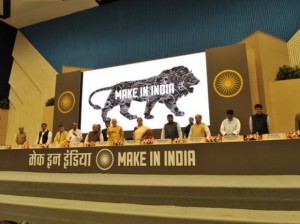PM Modi launches ‘Make in India’ campaign to drive create Jobs
 NEW DELHI : Prime Minister Narendra Modi unveiled long-awaited labour reforms this morning, emphasising in his address that “ease of business is essential to the success of ‘Make in India,'” his government’s mega plan to turn India into a manufacturing hub.
NEW DELHI : Prime Minister Narendra Modi unveiled long-awaited labour reforms this morning, emphasising in his address that “ease of business is essential to the success of ‘Make in India,'” his government’s mega plan to turn India into a manufacturing hub.
Launching his government’s ambitious project to make India a manufacturing hub, Prime Minister Narendra Modi on Thursday promised effective and easy governance to help achieve high growth and creation of jobs.
Kicking off the “Make in India” campaign, he said his government’s focus will be on physical infrastructure creation as well as creating a digital network for making India a hub for global manufacturing of goods ranging from cars to softwares, satellites to submarines and paper to power.
The PM said, “Shramev Jayate (labour triumphs) has the same power as Satyamev Jayate (truth triumphs) does for the development of our nation.” Labour problems “must be seen through the eyes of the shramik (worker) not industrialists,” he said, adding that people must change their attitude towards those who do manual labour.
In the reforms today, the wage ceiling has been raised from Rs. 6,500 to Rs. 15,000 per month to ensure vulnerable groups are covered under the EPF scheme. A minimum pension will also be introduced for the first time, so after retirement, a person gets at least Rs. 1,000 per month.
The new system also aims at getting rid of what is called the “Inspector Raj” or terror rule of inspectors that has hobbled industry for many years. “Inspector Raj…we heard this since our childhood and we thought it is for policemen, only but then we realised it’s a lot more,” Mr Modi said.
About 1,800 labour inspectors across the country will get text messages from the Prime Minister today apprising them of the new rules. Two key areas of the reforms will be “Shram Suvidha” – a unified labour and industrial portal, where all data will be stored. The other will be the “Labour Inspection Scheme,” which aims at ending arbitrariness in the inspection mechanism.
Inspection lists will now be made centrally and will be generated randomly by computer. Every inspection will have objective criteria and the report will have to be uploaded on the unified portal within 72 hours.
This is radically different from the present system, under which units for inspection are selected locally, without any objective criteria, allowing inspectors to harass unit owners and even exploit them in cases of violation.Each of the six to seven lakh industrial units in the country will also get a unique Labour Identification Number, or LIN.
Apart from disinvestment and land acquisition, labour is one of the areas in which India Inc has demanded decisive action. During his visit to the US earlier this month, investors and CEOs of multinationals complained to the Prime Minister that red tape and labour laws were the chief deterrents to doing business in India.

